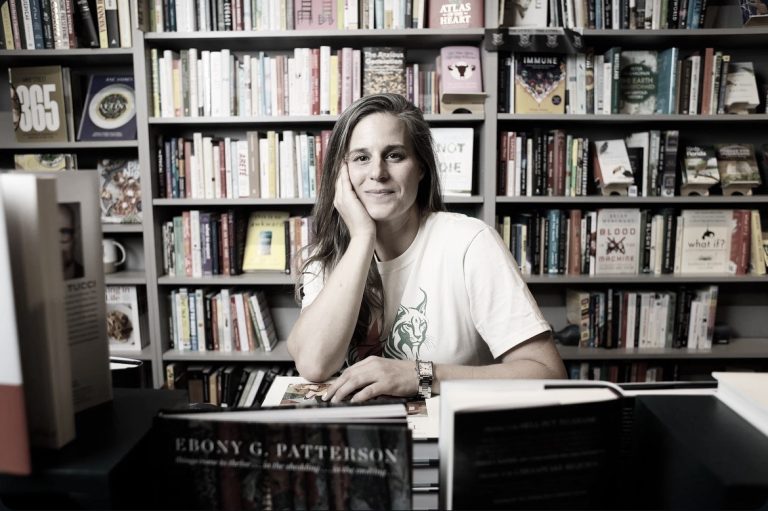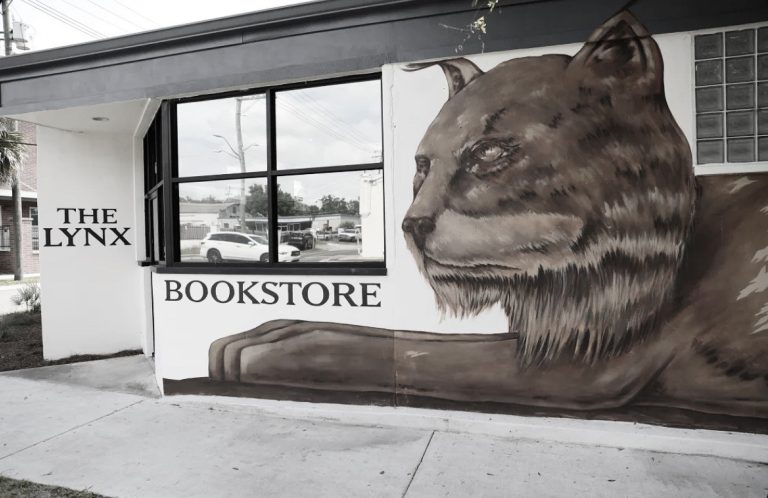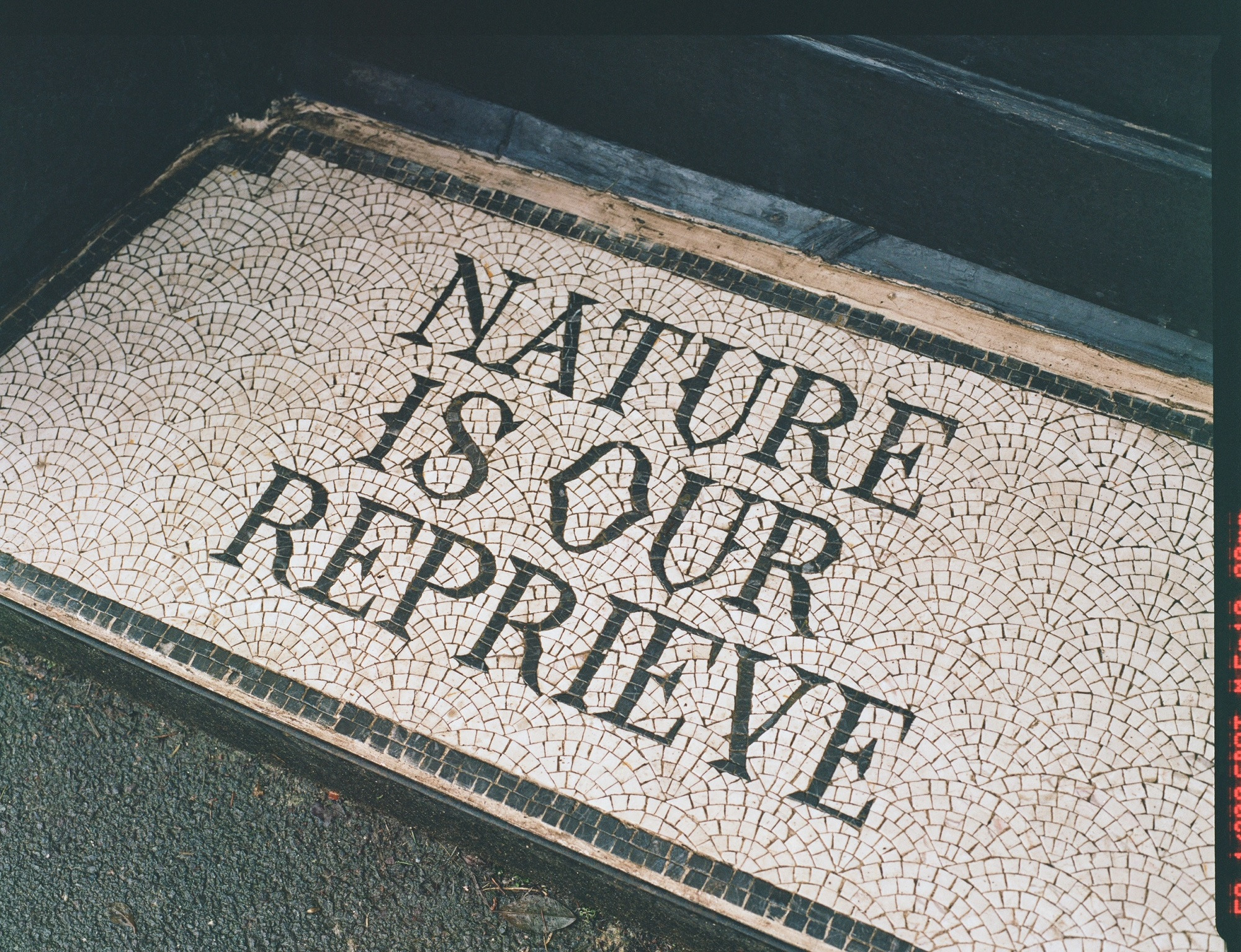
Heart's Ink
Updated: 2024/10/11
- Interview
- Emma Leokadia Walkiewicz
A mural of a lynx watches over an unassuming street corner in Gainesville, Florida, with the accompanying words “Watch us bite back,” a warning and promise in equal measure. It is acclaimed author Lauren Groff’s message to those banning literature in her adopted home state of Florida, where in April 2024 she opened The Lynx Books with her husband, Clay Kallman.
Creating a safe space to access and celebrate inclusive literature is paramount to fighting the bans, says Groff. “It’s an absurdity. It's authoritarianism at its very worst to forbid other people's children from accessing books that offend you.” The bestselling author of 'The Monsters of Templeton', 'Arcadia', 'Matrix', and most recently, 'The Vaster Wilds', possesses a unique perspective on the issue; her own novel 'Fates and Furies' is among 58 books banned in one Florida school district.
In an interview for Violet Online, Lauren Groff discusses the joys of running a bookstore and how she is building a vital community for readers amidst a challenging literary landscape.
First of all, congratulations on the recent opening of The Lynx! Can you describe what the first few days felt like after years of dreaming and planning?
Thank you!
I think we were all pretty euphoric when we first opened the doors in April. Clay and I had been dreaming for so long of opening a bookstore that after we signed the lease, we were pretty prepared to launch immediately into six months of extremely long hours. It was sheer relief to finally see things come to life, and so beautifully, too.
We had a lot riding on the success of the store; for instance, we'd lured our incredible managers from Virginia and Tallahassee to help us open, and we felt the weight of that huge decision on their lives and wanted to make something they'd feel proud of. Plus, we had leaned so heavily on our communities to get the store open that we were pretty anxious that perhaps things might not go as smoothly as we'd hoped—we didn't want to disappoint anyone.
When, at last, we opened, only to be embraced so heartily by our community, we were so deeply moved and emotional that we'd both get misty a few times a day. I still do, a few months in.
The Lynx highlights books that are challenged or banned in Florida. There’s a gorgeous mural on the side of the building accompanied by the words “Watch us bite back." Your husband Clay is a co-owner—his family owned The Florida Bookstore from the 1930s until it was sold in the late ‘90s. Do you remember the first conversation the two of you had about opening a bookstore?
Yes! Clay had spent his whole childhood in a bookstore—as a teenager, he was in charge of their point-of-sale system and had to train all the new employees (mostly college kids) on how to operate it. My father-in-law is a very canny man and saw Amazon coming before it really became the behemoth it is, and he got out of the business before the family store could go down in flames.
From the day we moved back to Gainesville in 2006, Clay and I have been talking about opening a bookstore, but Clay's father warned us very sternly against doing so, and he was right for a lot of that time. That said, there has been an incredible resurgence of independent bookstores in this country. Communities have really begun to understand the importance of buying their books from local independents.
We spent the last 10 years trying to find a building to buy, but it was far more difficult than it should have been. Then, when we saw the space to rent at South Main Station, we saw the potential juggernaut we could build there.
You’ve said that The Lynx is not just your store—it belongs to anyone and everyone who feels threatened or marginalized; it belongs to those who are seeking a sense of community. You want it to be a lighthouse for readers. Where was your lighthouse as a young reader?
I'm from a tiny hamlet in upstate New York, Cooperstown, and I had a truly idyllic childhood. My parents are extremely hard workers, but they let their kids have a free-range childhood, and I spent all summer roving around the woods, camped out in the gorgeous fieldstone public library only a few blocks from my house, or up in a tree, reading. My exterior life was full of sun and dogs and swimming and love, and my interior life was peopled thickly with characters from the many, many books my parents gave all three of their children the freedom to read. This is excellent parenting. I believe firmly that we need to let children read everything they want to read, and if there are things in the books that they choose that are challenging to our own belief systems, we, as good parents, should have the necessary conversations with our children.
I let my kids read 'Tintin', and we have awesome conversations about colonialism, racism, empire, and attitudes from the past that are no longer countenanced, for good reason. If you don't like something in a book, it's good parenting to talk to your child and situate the book within your moral system. It's an absurdity—it's authoritarianism at its very worst—to forbid other people's children from accessing books that offend you. Literature was my lighthouse as a child, and I want literature to be a lighthouse for all children.
What has been the biggest surprise so far with running the store? What has touched you most in the last few months?
I'm so profoundly touched on a daily basis, honestly. We have received so many letters from people who fled Florida because of its retrograde attitudes toward transgender and gay people; we have had so many messages from people across the country who have despaired about the Sunshine State and have found a glimmer of hope in our stance. We are here to spread love. We're here to give people tools for upholding common sense, empathy, and kindness. We will be giving away so many banned books to Floridians now that our 501c3 has been approved. Getting those contributions and planning with community nonprofits to give out those books has been such a joy.

The Lynx opened in the eye of the storm as far as challenged literature in America goes. PEN America recorded 3,362 book bans in the 2022–2023 school year—1,406 of those book ban cases were in Florida schools. That was last year; the numbers have now increased. Your own novel, 'Fates and Furies', is among them. You’ve mentioned that technically it’s a very small group of people behind the banning—that “the will of the minority is being enacted upon the majority."
What would you say, mother to mother, human to human, to the people backing the book bans? Do you feel a rational dialogue can even be had at this point?
I do think that there can be a rational dialogue because book bans have come and gone throughout the history of the United States and because they are so deeply unpopular. 85% of Floridians find them absurd. We see them for what they are: a distraction to enable other extreme assaults on the general populace. If the people challenging books really cared about the well-being of children, they wouldn't ban books; they'd ban the things that hurt and kill children every single day—they'd ban guns. It's telling that there's zero political will from that side of the aisle to ban guns.
Book bans are both a huge distraction designed to cover many other extreme assaults on our rights—like the right for people with uteruses to control their own bodies or the right for all people to have access to fresh water and air and shelter and medical care and education—and at the same time, they're also the very tip of a huge and dangerous authoritarian wedge. All genocides in recent memory have begun with the attempt to erase people through the erasure of their literature. Heinrich Heine said in 1829: "In the places where people burn books, they will one day burn people."
Book bans are both a distraction so that authoritarian creep can eat
away at our rights and the beginning of far darker, far worse things to
come.
Can you recommend five banned or challenged books (whether personal favourites or ones that you feel should be on everybody’s radar) that readers can find at The Lynx?
Of course, most of the books banned and challenged are books that represent LGBTQI+ or BIPOC narratives, as the push to ban books is truly a bush to delegitimize the voices of people the book banners deem unworthy. The essential unseriousness of these people, though, can be seen in the fact that magnificent works of literature have been banned: Toni Morrison's 'Beloved', George Orwell's '1984', Margaret Atwood's 'A Handmaid's Tale', William Shakespeare's 'The Merchant of Venice', and James Baldwin's 'Giovanni's Room'. In one district, the dictionary was banned. Silly.
As bad as the overt challenges and bans, however, are the tacit bans
that librarians and teachers feel obligated to impose on their own
shelves. I have a wonderful friend, Laura Maxwell, who teaches fifth
grade. She used to teach about the Holocaust by teaching Art
Spiegelman's 'Maus' but now she's too terrified to do so. I find this chilled intellectual atmosphere just as pernicious as the outright bans.
I loved what you said in another interview and want to include
it here: that reading “is the best technology humans have ever made.
We’ll never make anything more beautiful than the book.” As someone who
intimately understands the importance and power of the written word, can
you summarize what the magic of literature is for you now as not only a
writer but as the owner of a bookstore?
Literature is magical. Books are a way of transplanting a human soul
into another human soul. We walk around the world with the voices of
geniuses ringing in our heads. Art, music, and literature are the best
of humanity, and we have found a way to distill this goodness and bestow
it on other people as a pure gift. If the impulse to make art still
exists in the world, there is hope for humanity.
In your TIME 'Person of the Week'
podcast interview, you shared that you have a contract with your
husband—he makes breakfast for the kids and takes them to school while
you write. You said, "There are no humans for me in the morning other
than the humans in the book.” It’s hard enough to carve out the time to
write without owning and running a bookstore—how are you managing now?
I'm writing every day! It's not the best work I've ever done—I have a
hard time fully immersing myself, it's true, when I'm always so anxious
and stressed out. I take solace, though, in that there are always
fallow times. If I show up every single day and work as well as I can,
the times when I'm not making anything to keep and put into the world
are just as important as when I'm writing as a white heat. I'm keeping
the muscles limber for when I've learned better balance and freedom
within these new constraints. Someday, I hope—I have to have faith! —the
magic will come back.
How do you hope The Lynx and the space it holds will influence and change the literary landscape in Florida?
I want to change things in both tangible and intangible ways. I want us to give away as many banned books to Floridians as we possibly can. I want to celebrate and promote the writers of books under attack in Florida. I want to ensure that the people who desperately need to see themselves reflected in books have the ability to do so, whether it means putting the hard-to-swallow history of slavery in the United States in front of the eyes of children whom the state of Florida is currently failing in this regard (there are history school books approved here in which the "positive" aspects of slavery are being taught) or making sure a little transgender girl can see transgender heroines like her in the books she reads. I want to make large literary changes through our nonprofit arm—The Lynx Watch, Inc.—and to make vast, less tangible waves, to radiate tolerance and ideas outward, to celebrate the literary history of Florida, and to signal to the rest of the country not to give up on Florida, and that even though we are at the moment being run by authoritarians, there are plenty of smart, good, community-minded people here who are putting up quite a fight.
Visit The Lynx Books at 601 South Main Street in Gainesville, Florida.
Visit girlsonthepage.com.
Related Articles

Liberty 150 x150 curated by Leith Clark: The Founder Interviews

Liberty 150 x150 curated by Leith Clark: The Founder Interviews

Liberty 150 x150 curated by Leith Clark: The Founder Interviews

Liberty 150 x150 curated by Leith Clark: The Founder Interviews



